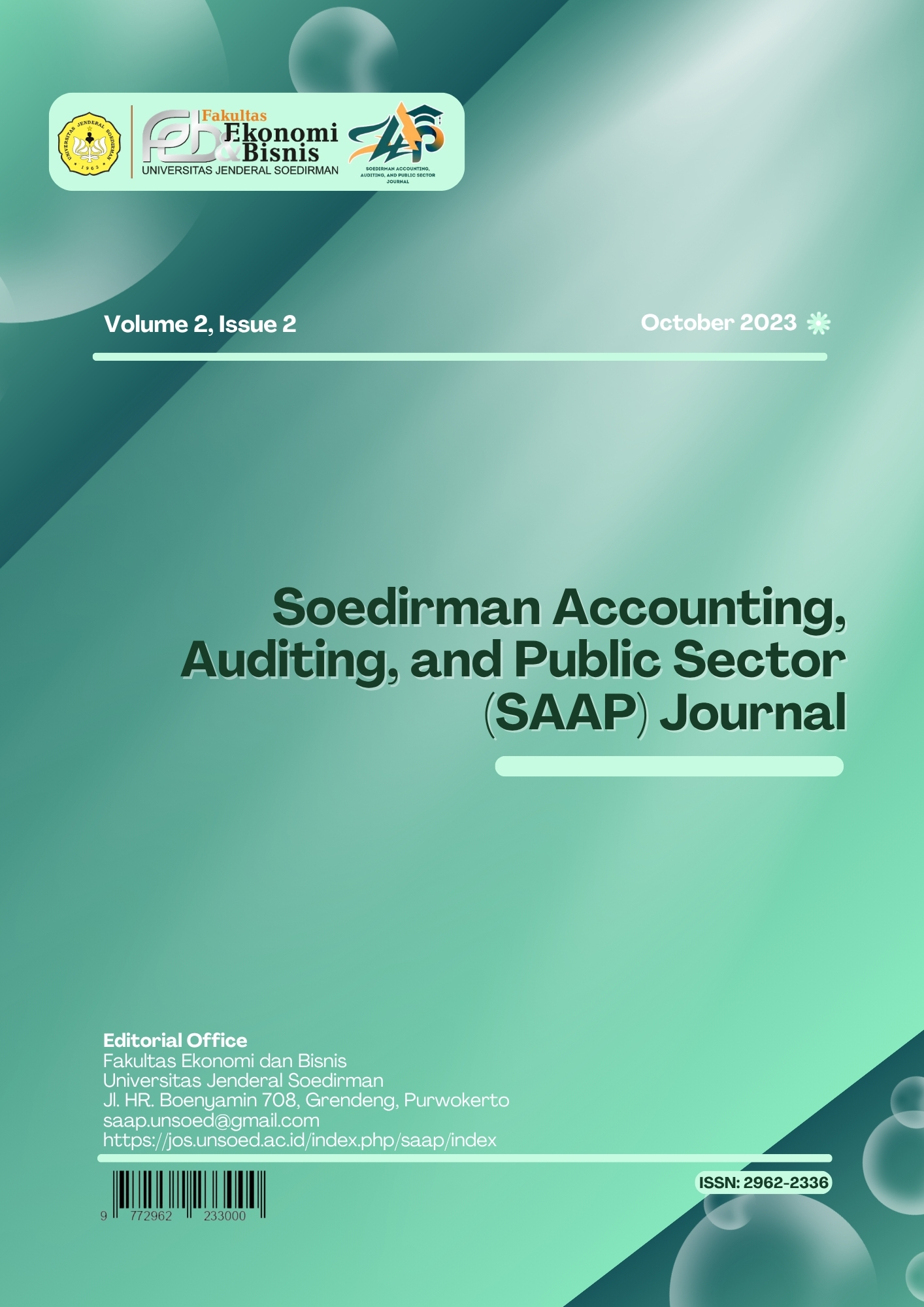A ISLAMIC SOCIAL REPORTING: MENGUJI PENGARUH DARI MAQASHID SHARIA INDEX, SHARIA SUPERVISORY BOARD, MEDIA EXPOSURE, DAN COMPANY SIZE DI PERBANKAN SYARIAH INDONESIA
Abstract
The growth of Islamic banking, issues related to sustainable business practices and adherence to Sharia principles are increasingly coming into focus. In order to understand the dynamics of social reporting in the context of Islamic banking in Indonesia, this study aims to analyze the influence of Maqashid Sharia Index, Sharia Supervisor Board, Media Exposure, and Company Size on Islamic Social Reporting in Indonesian Islamic banks listed on the Indonesia Stock Exchange from 2018 to 2020. The study employed purposive sampling, and 39 companies met the criteria as the unit of observation. The analysis was conducted using multiple linear regression. The results provide empirical evidence that Sharia Supervisor Board, Media Exposure, and Company Size have a significant influence on Islamic Social Reporting, while Maqashid Sharia Index does not have a significant impact on Islamic Social Reporting.
References
Anggraeni, D. Y., Kartika, R., & Yuskar, Y. (2020). Muslim Ceo and Islamic Social Reporting Disclosure: Evidence From Indonesia. Media Riset Akuntansi, Auditing & Informasi, 20(2), 169–184. https://doi.org/10.25105/mraai.v20i2.6089
Arifin, R., Rosadi, S., Nugroho, A., & Wahyuningsih, T. (2021). Characteristics of the Sharia Supervisory Board, Sharia Company Size, Zakah, and Islamic Social Reporting on Sharia Banks in Indonesia. Falah: Jurnal Ekonomi Syariah, 6(2), 15–28. https://doi.org/10.22219/jes.v6i1.17100
Budi, I. S. (2021). Islamic Corporate Social Responsibility (ICSR) disclosure and Islamic Banks (IBs) performance: The application of stakeholder theory from Islamic perspective. Jurnal Akuntansi & Auditing Indonesia, 25(1), 76–86. https://doi.org/10.20885/jaai.vol25.iss1.art8
Fitranita, V., Widiyaksa, D., & Asmawanti, D. (2023). The influence of company size, company age, profitability, leverage, sales growth, and independent board of commissioners on Islamic social reporting disclosures. Proceeding of International Conference on Accounting and Finance, 1(2002), 66–75. https://doi.org/10.20885/InCAF.vol1.art8
Hasnia, & Rofingatun, S. (2017). Pengaruh Profitabilitas, Likuiditas , Growth Dan Media Exposure Terhadap Pengungkapan Tanggung Jawab Sosial Perusahaan. Jurnal Akuntansi & Keuangan Daerah, 12(1), 56–71.
Ilyas, R. (2021). Peran Dewan Pengawas Syariah Dalam Perbankan Syariah. JPS (Jurnal Perbankan Syariah), 2(1), 42–53. https://doi.org/10.46367/jps.v2i1.295
Khavarinezhad, S., Biancone, P., & Jafari-Sadeghi, V. (2021). Financing in the Islamic System and Sustainable Economic Development of Selected Islamic Countries. European Journal of Islamic Finance, 19(2021), 18–23. https://doi.org/10.13135/2421-2172/6158
Khoiriyah, V. N., & Salman, K. R. (2020). The Effect of the Maqashid Sharia Index, Company Size, and Company Age on Islamic Social Reporting. Muqtasid: Jurnal Ekonomi Dan Perbankan Syariah, 11(2), 117–132. https://doi.org/10.18326/muqtasid.v11i2.117-132
Meldona, Riska, N. A., Rochayatun, S., & Nurdin, F. (2020). Corporate Social Responsibility Disclosure Through Sharia Enterprise Theory. 135(Aicmbs 2019), 171–179. https://doi.org/10.2991/aebmr.k.200410.026
Mukhibad, H., & Fitri, A. (2020). Determinant of Islamic Social Reporting (ISR) Disclosure. KnE Social Sciences, 2020, 478–489. https://doi.org/10.18502/kss.v4i6.6620
Najla, A. H., & Anggraeni, D. Y. (2021). the Effect of Media Exposure and Slack Resources on Corporate Social Responsibility Disclosure. 40, 885–902.
Ningsih, N. W., Ghofur, R. A., & Pratiwi, R. A. (2021). Growth dan Media Exposure terhadap Pengungkapan Islamic Social Reporting. Finansia: Jurnal Akuntansi Dan Perbankan Syariah, 4(1), 29–38. http://e-journal.metrouniv.ac.id/index.php/FINANSIADOI:https://doi.org/10.32332/finansia.vxxixx.xxxx
Nugraheni, P. (2018). Jurnal Akuntansi dan Auditing Indonesia Sharia supervisory board and social performance of Indonesian Islamic banks. Jurnal Akuntansi Dan Auditing Indonesia, 22(2), 137–147.
Oktaviana, U. K., Jaya, T. J., & Miranti, T. (2021). The Role of Islamic Social Reporting, Islamic Corporate Governance and Maqashid Syariah Index on Firm Value with Firm Size as Moderation Variable. Proceedings of the International Conference on Engineering, Technology and Social Science (ICONETOS 2020), 529(Iconetos 2020), 195–201. https://doi.org/10.2991/assehr.k.210421.028
Prasetyo Aji, N., Aulia Rahman, F., Oshiana Fitria, L. A., & Wahyu Widawati, M. (2023). Carbon Emission Disclosure: The Influence of External Stakeholder Pressure and Environment Performance. International Journal of Social Science, Education, Communication and Economics, 2(3), 687–697. https://doi.org/10.54443/sj.v2i3.125
Rismayanti, D., & Aisyah, E. N. (2023). Evidence of Moderation Maqashid Sharia : Financial Performance, Islamic Social Reporting and The Value of the Company. Perisai : Islamic Banking and Finance Journal, 7(1), 77–91. https://doi.org/10.21070/perisai.v7i1.1659
Salman, K. R., Muslich, A., & ... (2018). New Evidence On The Direct And Indirect Influence Of The Maqashid Sharia Index On The Islamic Social Reporting Index. International Journal of …, 5(8), 165–173. https://doi.org/10.5281/zenodo.1405433
Schmuck, D., Heiss, R., & Matthes, J. (2020). Drifting Further Apart? How Exposure to Media Portrayals of Muslims Affects Attitude Polarization. Political Psychology, 41(6), 1055–1072. https://doi.org/10.1111/pops.12664
Sukmawati Yuniar, L., & Tadulako, U. (2022). the Effectiveness of Women on Boards in Affecting Islamic Social Reporting Disclosure Andi Ainil Mufidah Tanra Andi Chairil Furqan. Jurnal Kajian Ekonomi Islam, 7(1), 2022.
Utomo, W. P. A., Achyani, F., & Zulfikar. (2022). The Effect of Islamic Social Reporting, and Good Corporate Governance on Firm Value Using the Maqashid Syariah Index as a Moderating Variable. Proceedings of the International Conference on Economics and Business Studies (ICOEBS 2022), 655(Icoebs), 358–370. https://doi.org/10.2991/aebmr.k.220602.048
Wardani, M. K., & Sari, D. D. (2019). Disclosure of Islamic Social Reporting in Sharia Banks: Case of Indonesia and Malaysia. Journal of Finance and Islamic Banking, 1(2), 105. https://doi.org/10.22515/jfib.v1i2.1495
Wijayanti, R., & Setiawan, D. (2022). Social Reporting by Islamic Banks: The Role of Sharia Supervisory Board and the Effect on Firm Performance. Sustainability (Switzerland), 14(17), 1–25. https://doi.org/10.3390/su141710965
Fitranita, V., Widiyaksa, D., & Asmawanti, D. (2023). The influence of company size, company age, profitability, leverage, sales growth, and independent board of commissioners on Islamic social reporting disclosures. Proceeding of International Conference on Accounting and Finance, 1(2002), 66–75. https://doi.org/10.20885/InCAF.vol1.art8
Khoiriyah, V. N., & Salman, K. R. (2020). The Effect of the Maqashid Sharia Index, Company Size, and Company Age on Islamic Social Reporting. Muqtasid: Jurnal Ekonomi Dan Perbankan Syariah, 11(2), 117–132. https://doi.org/10.18326/muqtasid.v11i2.117-132
Schmuck, D., Heiss, R., & Matthes, J. (2020). Drifting Further Apart? How Exposure to Media Portrayals of Muslims Affects Attitude Polarization. Political Psychology, 41(6), 1055–1072. https://doi.org/10.1111/pops.12664
Wijayanti, R., & Setiawan, D. (2022). Social Reporting by Islamic Banks: The Role of Sharia Supervisory Board and the Effect on Firm Performance. Sustainability (Switzerland), 14(17), 1–25. https://doi.org/10.3390/su141710965





